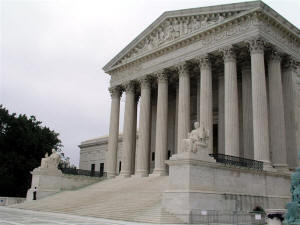U.S. Supreme Court justice considering action on Illinois’ assault
weapons ban
 Send a link to a friend
Send a link to a friend
[May 11, 2023]
By PETER HANCOCK
Capitol News Illinois
phancock@capitolnewsillinois.com
 SPRINGFIELD – A single justice of the U.S. Supreme Court is now weighing
whether to block Illinois’ assault weapons ban from being enforced while
the case is being heard in the Seventh Circuit Court of Appeals. SPRINGFIELD – A single justice of the U.S. Supreme Court is now weighing
whether to block Illinois’ assault weapons ban from being enforced while
the case is being heard in the Seventh Circuit Court of Appeals.
Justice Amy Coney Barrett, who hears applications from the Seventh
Circuit, could decide on her own whether to issue an emergency
injunction or she could refer the question to the full court for
consideration.
The case involves both the state’s ban on assault weapons and large
capacity magazines as well as a local ordinance in the city of
Naperville. Both laws were enacted in response to a mass shooting at an
Independence Day parade last year in Highland Park. Although the state
ban was temporarily blocked by the courts, both laws are currently in
effect.
The National Association for Gun Rights, along with a local gun store
owner in Naperville, challenged the Naperville ordinance shortly after
it was enacted in August 2022 and then added the state as a defendant
after the state ban went into effect in January. They argue that both
laws violate the Second Amendment right to keep and bear arms.

Their lawsuit sought a temporary restraining order and a preliminary
injunction to block enforcement of the laws. But on Feb. 17, Northern
District Court Judge Virginia Kendall denied those motions, saying
“particularly ‘dangerous’ weapons” like those banned under the laws are
not protected by the Second Amendment.
The plaintiffs then appealed to the Seventh Circuit and asked that court
for an emergency injunction pending appeal, but the appellate court
rejected that motion on April 18. They next sought an injunction through
the U.S. Supreme Court.
At the Supreme Court, applications for stays or injunctions are filed
with a justice assigned to hear applications from that appellate
circuit. In the case of the Seventh Circuit, that is Justice Barrett.
[to top of second column]
|

The U.S. Supreme Court building is
pictured in Washington, D.C. (Credit: Morguefile.com)

On May 1, Barrett requested more information from the state and the
city. Attorney General Kwame Raoul’s office, which represents both
defendants, filed its response on Monday and the National Association
for Gun Rights filed its reply brief Wednesday.
The state argues that the application for an injunction should be denied
because the plaintiffs failed to show that they are likely to prevail on
the merits of their claim, one of the requirements for granting an in
junction.
“Nor could they, since this Court has not addressed a Second Amendment
challenge to a law
similar to the (Protect Illinois Communities) Act,” the brief states.
It notes that two district court judges in Illinois, including Kendall,
have refused to enjoin the act, and four district court judges in other
states have declined to enjoin similar laws.
But on April 28, Judge Stephen P. McGlynn, in the Southern District of
Illinois, granted a temporary injunction, although the Seventh Circuit
later stayed that order while McGlynn’s decision is appealed.
The plaintiffs counter that they are likely to prevail on the merits of
their case because the laws ban weapons that are commonly used for
lawful purposes.
“AR platform rifles are just one of the many types of rifles banned by
name and/or by feature,” they wrote in their brief. “At least 20 million
AR-15s and similar rifles are owned by millions of American citizens who
use those firearms for lawful purposes.”
Barrett has not indicated how quickly she will decide on the application
or whether she will refer it to the full court for consideration.
Capitol News Illinois is a nonprofit, nonpartisan news
service covering state government. It is distributed to hundreds of
print and broadcast outlets statewide. It is funded primarily by the
Illinois Press Foundation and the Robert R. McCormick Foundation, along
with major contributions from the Illinois Broadcasters Foundation and
Southern Illinois Editorial
 |